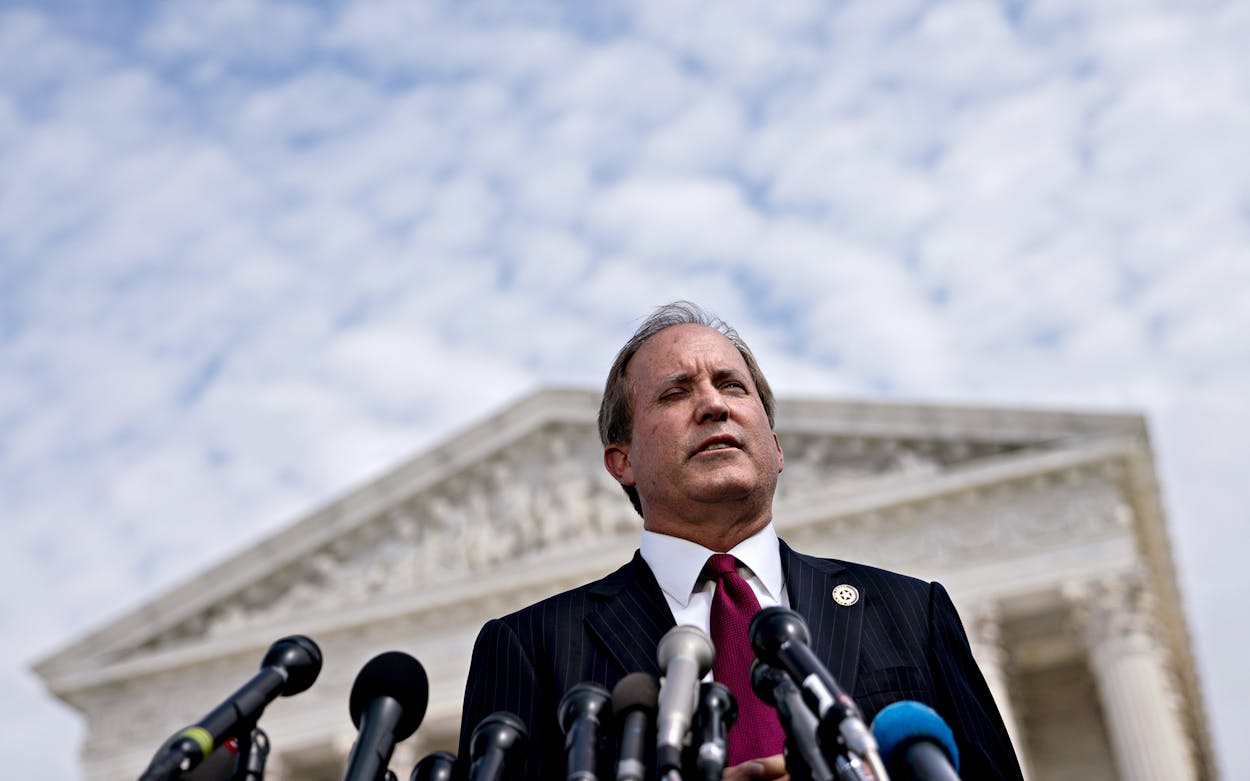Ken Paxton has been under indictment for most of his tenure as Texas attorney general. This hasn’t stopped voters from reelecting him—twice—to serve as the state’s top law enforcement official. That’s not purely a matter of Texas voters favoring Republicans over Democrats, either. In 2020, near the midpoint of his second term, seven of Paxton’s top aides sent a whistleblower letter accusing the attorney general of corruption, including abuse of office, bribery, and improper influence, relating to Austin real estate developer Nate Paul. Then, in 2022, Paxton faced not one but three well-funded primary challengers; he came within 8 points of escaping that primary without so much as facing a runoff, and in the second round, he trounced his opponent (George P. Bush, the last scion of the fading Bush dynasty) by 36 points. A few weeks later, he was reelected for a third term by a 10-point margin over his Democratic challenger. Whatever your opinion of Paxton, his political fortunes have seemed downright bulletproof.
On Tuesday, though, he appeared to face a real test: a hearing in the House Committee on General Investigating regarding that 2020 whistleblower complaint and alleged misdeeds was scheduled for the following day. Paxton responded the way most cornered animals would—by lashing out at the threat. He released a statement calling on House speaker Dade Phelan to resign, accusing Phelan of having presided over the House while drunk, a response to a viral video in which the speaker slurred his words from the dais. (A spokesperson for Phelan called the statement “a last-ditch effort to save face” before the hearing.)
Was Phelan drunk? Who knows; it’s a short video clip. One thing we do know is that whatever was going on in the viral clip has nothing to do with the allegations that were outlined, in exacting detail, during Wednesday’s hearing.
While much of what was discussed in the hearing had been previously reported, the narrative laid out by the four-person investigation team was nonetheless stark in what it alleged. Paxton, according to the team led by former assistant U.S. attorney Erin Epley, acted at the behest of Paul—a young real estate developer whose own offices were raided by agents from the FBI and the Department of the Treasury in 2019—to hire a lawyer with just a few years of experience on the bar (and none as a prosecutor) as an outside independent prosecutor to the attorney general’s office, a role that does not exist in Texas. That lawyer, Brandon Cammack, was paid $300 an hour by Texas taxpayers to issue subpoenas targeting a number of officials who threatened Paul’s empire, including several at the Department of Public Safety, the FBI, and the U.S. attorney’s office. As a result, Cammack could have received access to unredacted copies of documents that contained information about individuals involved in the investigation against Paul.
Paxton, meanwhile, received $25,000 in campaign contributions from Paul, whom whistleblowers said also furnished the attorney general with a “floor-to-ceiling renovation” of Paxton’s home in Austin, and hired a woman with whom Paxton is alleged to have conducted an affair at the AG’s request.
At one point, committee member Ann Johnson, a Democrat from Houston, asked Epley, “Is it fair to say that [the Office of the Attorney General] was effectively hijacked for an investigation by Nate Paul through the attorney general, Ken Paxton?” to which Epley replied, “That would be my opinion.”
Paxton, for his part, has continued to lash out. He released a statement Wednesday afternoon decrying the “liberal leadership” of the House (Phelan is a Republican), accusing Phelan and others of having “demonstrated nothing but contempt for the traditional values of conservative Texans” out to “sabotage” his work and accusing the investigators of being “highly partisan Democrat lawyers” who offered “false testimony” to further “the goal of manipulating and misleading the public.” (The whistleblowers, Epley noted, were “conservative Republican civil servant[s].”)
Thus far, Paxton has managed to avoid anything resembling real accountability even as the allegations against him have continued to pile up. He’s managed to avoid a trial for an indictment issued nearly eight years ago, for example, and cruised to reelection after reelection. The committee hearing indicated that there may be limits to his political invulnerability, however—chair Andrew Murr, a Republican from Junction, declared after an investigator’s outlining of crimes Paxton is alleged to have committed that the alarming testimony “curls my mustache.”
Paxton could well face additional federal charges related to those allegations, but the House also has unique power here: It could vote to impeach Paxton. Should it do so, removal from office would fall to the Texas Senate, where Paxton has more allies than he does in the House. Whether accountability for the AG ends at merely adding another epithet that could precede his name—from “embattled and indicted” to “embattled, indicted, and impeached”—or something more serious is a matter for a later day (and Paxton and his defense lawyers have proven themselves skilled at stretching the later days out as far as possible), but anybody with a mustache who watched the hearing probably felt it curl a bit.








